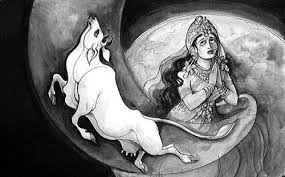The Origin of Rules

Animals compete for mates and fight over territory. Humans do not have to. Rules ensure this. Animals do not eat more than they have to. But humans do. Rules prevent this.
Long ago, there were no rules. A man called Vena plundered the earth for all its resources. Disgusted, the earth took the form of a cow and ran away. So the rishis picked up a blade of grass, chanted mantras to turn the grass into a missile, and directed it to kill Vena. When Vena died, his body was churned. All that was undesirable in him was cast away.
From the purity that remained was created a man called Prithu. Prithu pursued the earth-cow and begged her to feed his people. The earth-crow refused. So Prithu raised his bow.
The earth-cow shouted, ‘If you kill me who will feed your people?’
Prithu shouted back, ‘If you keep running away, who will feed my people?’
Finally the earth-cow stopped and allowed Prithu’s people to milk her. ‘How will you stop them from milking me till my udders are soar? she asked.
‘I will create rules,’ said Prithu. In nature, there are no rules. But culture shall be based on rules. The king shall uphold rules.’
Prithu was the first king. The bow was his symbol. The ruler was the shaft and the rules were the string. Too loose, the bow was useless; too tight, and the bow would break. Prithu was Vishnu, upholder of social order, preserver of the balance between nature and culture. He promised the earth-cow that whenever rules of society were disrupted and she was exploited, he would descend on earth to set things right. The earth was so pleased that she called herself Prithvi, daughter of Prithu.
– From Devdutt Pattnaik’s ‘Sita – An illustrated retelling of the Ramayana’
Short URL: https://indiandownunder.com.au/?p=15467
